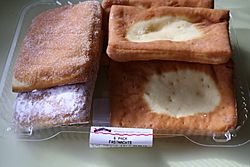Fasnacht (doughnut) facts for kids

Assorted rectangular fasnachts
|
|
| Alternative names | Fosnot, fosnaught |
|---|---|
| Type | Doughnut |
| Place of origin | Germany |
Fasnacht (pronounced FAHS-nahkt) is a special kind of fried doughnut. It comes from Germany. People traditionally eat Fasnachts during the Carnival season or on Shrove Tuesday. Shrove Tuesday is the day right before Lent begins. Lent is a time when some people give up certain foods. Fasnachts were a clever way to use up ingredients like lard, sugar, fat, and butter. These were foods people often avoided during Lent.
Contents
What is Fasnacht?
Fasnacht is a delicious treat, often shaped like a doughnut. It is deep-fried until golden brown. The German version is usually made from a yeast dough. After frying, it can be covered in powdered sugar or cinnamon sugar. Some Fasnachts are plain, while others might be filled with fruit jam.
Fasnacht in Pennsylvania
In the United States, Fasnacht is very popular among the Pennsylvania Dutch community. This group of people lives in counties like Lancaster, York, and Berks in Pennsylvania. Many supermarkets in eastern Pennsylvania sell Fasnachts, especially around Shrove Tuesday.
Similar Treats
Fasnacht is similar to other fried pastries around the world. One example is the Polish Pączki (pronounced POONCH-kee). Pączki are also doughnuts, but they are usually round. They are often filled with jelly or cream. In Poland, Pączki are traditionally eaten on the Thursday before Fasnacht Day. However, in Polish communities in the U.S., they are often enjoyed on Fasnacht Day itself.
In parts of Maryland, these treats have different names. They are sometimes called Kinklings or "Kuechles." These special pastries are typically sold only in bakeries on Shrove Tuesday.
Potato Doughnuts
Some Pennsylvania Dutch Fasnachts are made from potato doughnut dough. This gives them a unique texture. These potato Fasnachts might be left plain, or they could be dusted with regular table sugar or fine confectioner's sugar.
The Meaning of the Word Fasnacht
The word "Fasnacht" is also the name for the Carnival season itself. This is especially true in southern Germany, Switzerland, Alsace, and Austria. While often spelled "Fastnacht," you might hear it pronounced in many local ways, like "Fassenacht" or "Fasnet."
The word "Fastnacht" comes from two German words. "Fast" is a shorter form of "fasten," which means "to fast" (to go without food). "Nacht" means "night." So, "Fastnacht" means "fasting night" or "the eve of the fast." It marks the night before the traditional Lenten fasting period begins. It is a celebration similar to Mardi Gras or Carnival in other parts of the world.
Images for kids
See also
 In Spanish: Fasnacht (pastel) para niños
In Spanish: Fasnacht (pastel) para niños
 | William L. Dawson |
 | W. E. B. Du Bois |
 | Harry Belafonte |



